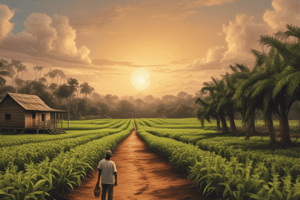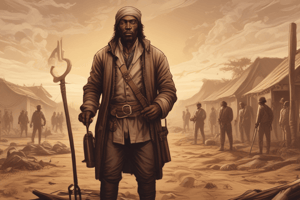Podcast
Questions and Answers
In the late 1700s, slavery was starting to die out, but the invention of the _________ _____ prompted plantation owners to keep their slaves to support the larger cotton harvests.
In the late 1700s, slavery was starting to die out, but the invention of the _________ _____ prompted plantation owners to keep their slaves to support the larger cotton harvests.
cotton gin
Cotton accounted for ____% of the value of all American exports after 1840.
Cotton accounted for ____% of the value of all American exports after 1840.
50
Britain imported 75% of its raw cotton from the South, in order to make cotton cloth. Because of this, the South had a significant ______________ on Britain.
Britain imported 75% of its raw cotton from the South, in order to make cotton cloth. Because of this, the South had a significant ______________ on Britain.
influence
What type of government did the South have?
What type of government did the South have?
What type of people typically affected governmental decisions in the South?
What type of people typically affected governmental decisions in the South?
The Southern economy was very dependent on __________, which made the economy ____________.
The Southern economy was very dependent on __________, which made the economy ____________.
Why did the majority (75%) of the Southern white population support slavery?
Why did the majority (75%) of the Southern white population support slavery?
Less than ___% of the Southern white population were wealthy slave owners.
Less than ___% of the Southern white population were wealthy slave owners.
What were the less prosperous non-slaveholding whites referred to as?
What were the less prosperous non-slaveholding whites referred to as?
Many free blacks settled in ______ ____________.
Many free blacks settled in ______ ____________.
Free blacks faced a lot of ___________________ in the North and South.
Free blacks faced a lot of ___________________ in the North and South.
What were free blacks in the South known as?
What were free blacks in the South known as?
What was the Black Belt region of the United States?
What was the Black Belt region of the United States?
Blacks managed to sustain family life in slavery. They also formed their own religions from a mixture of ____________ and ___________ elements.
Blacks managed to sustain family life in slavery. They also formed their own religions from a mixture of ____________ and ___________ elements.
Why were slaves not allowed to read?
Why were slaves not allowed to read?
What was Nat Turner's Rebellion?
What was Nat Turner's Rebellion?
What was the American Colonization Society?
What was the American Colonization Society?
What was the Republic of Liberia?
What was the Republic of Liberia?
By 1860, all southern slaves were born in America, and many did not have a desire to __________ ____ __________.
By 1860, all southern slaves were born in America, and many did not have a desire to __________ ____ __________.
The Second Great Awakening inspired many __________________ to speak out against the sins of slavery.
The Second Great Awakening inspired many __________________ to speak out against the sins of slavery.
What was the American Anti-Slavery Society?
What was the American Anti-Slavery Society?
From 1831-1832, Virginia defeated numerous ___________________ bills.Other states followed suit, prohibiting all forms of ___________________.
From 1831-1832, Virginia defeated numerous ___________________ bills.Other states followed suit, prohibiting all forms of ___________________.
Why did Southerners argue that slavery was good?
Why did Southerners argue that slavery was good?
What did the Gag Resolution mandate?
What did the Gag Resolution mandate?
Why would it be a big deal if slavery were to be abolished in the U.S. during this time period?
Why would it be a big deal if slavery were to be abolished in the U.S. during this time period?
Study Notes
Slavery and the Cotton Economy
- The cotton gin, invented in the late 1700s, revived slavery by enabling larger cotton harvests, leading to the expansion of plantations.
- Cotton comprised 50% of all American exports post-1840, highlighting its economic significance.
- Britain relied on the South for 75% of its raw cotton, indicating the South's economic influence on British industries.
Governance and Social Structure
- The Southern government operated as an oligarchy, controlled by a small group of wealthy planters.
- The planter aristocracy disproportionately influenced political decisions, exacerbating wealth gaps between rich and poor.
Demographics and Social Issues
- Approximately 75% of Southern whites did not own slaves but supported slavery, aspiring for social mobility and slave ownership.
- Less than 1% of the Southern white population were affluent slave owners, while the non-slaveholding white majority were often derisively called "hillbillies" or "poor white trash."
- Free blacks predominantly settled in New Orleans and experienced significant discrimination in both Northern and Southern states.
Restrictions and Cultural Resilience
- In the South, free blacks were limited in job opportunities and could not testify against whites in court, labeled as the "3rd Race."
- The Black Belt region was a significant area where a large concentration of slaves resided, stretching from South Carolina and Georgia to Alabama, Mississippi, and Louisiana.
- Despite harsh conditions, enslaved African Americans maintained family structures and created a syncretic culture combining Christian and African religious elements.
Education and Rebellion
- Slaves were prohibited from reading due to fears that literacy would empower them to organize rebellions.
- Nat Turner led one of the largest slave rebellions in U.S. history; it ultimately failed but exemplified the resistance against slavery.
Abolitionist Movements
- The American Colonization Society aimed to purchase and free slaves, relocating them to Liberia, established in 1822 as a settlement for former slaves.
- By 1860, all Southern slaves were born in America; many had no desire to return to Africa.
- The Second Great Awakening spurred abolitionist sentiment, prompting groups like the American Anti-Slavery Society, founded in 1833, which advocated for immediate emancipation and racial equality.
Legislative Actions and Societal Consequences
- Between 1831-1832, Virginia and other Southern states defeated numerous emancipation bills, reinforcing the institution of slavery.
- Southern proponents of slavery argued it was biblically justified and beneficial for Africans by converting them to Christianity.
- The Gag Resolution (1836-1844) mandated that all anti-slavery petitions be tabled without debate in Congress, stifling discussions on slavery.
Economic Considerations of Abolition
- The abolition of slavery was seen as a threat to the economy; New England textile mills depended on cotton from enslaved labor. Ending slavery would disrupt supply chains, leading to job losses and economic distress in the North.
Studying That Suits You
Use AI to generate personalized quizzes and flashcards to suit your learning preferences.
Description
Explore key concepts from APUSH Chapter 16 focusing on the South and the slavery controversy. This quiz includes important definitions and statistics that shaped the era, such as the impact of the cotton gin on plantation economies. Test your understanding of this critical period in American history.




